Works of Robert J. Breckinridge (10 vols.)
Digital Logos Edition
Overview
Robert J. Breckinridge: Presbyterian minister, politician, author, abolitionist, and champion of education. Known as the "father of the Kentucky public school system" for increasing the number of children in school ten-fold during his tenure as superintendent of public education, and for his staunch support for the Union and President Lincoln during the Civil War (unpopular in his native Kentucky), Breckinridge was a man who blazed his own trail despite the difficult obstacles that stood in his way.
The Works of Robert J. Breckinridge (10 vols.) brings together all of his writings into one great collection, including his two-volume masterwork The Knowledge of God, Objectively Considered and The Knowledge of God, Subjectively Considered. The Works of Robert J. Breckinridge (10 vols.) also includes essays, speeches, sermons, Breckinridge's two-volume European travel memoir, and more. The fascinating Discussion on American Slavery offers a unique window into history and the abolitionist movements on both sides of the Atlantic right before the outbreak of the American Civil War.
Each volume in the Works of Robert J. Breckinridge (10 vols.) contains Breckinridge's rich prose and fiery passion. With the Logos Bible Software edition all Scripture passages in the Works of Robert J. Breckinridge (10 vols.) are tagged and appear on mouse-over. This makes these resources more powerful and easier to access than ever before for scholarly work or personal Bible study. With the advanced search features of Logos Bible Software, you can perform powerful searches by topic or Scripture reference—finding, for example, every mention of “slavery,” or “communion.”
This title is included in the following collections
You can save when you purchase this product as part of a collection.
Logos 6 Reformed Gold Legacy L...
$849.99$849.99Logos 5 Reformed Gold Legacy L...
$849.99$849.99Logos 6 Reformed Platinum Lega...
$1,499.99$1,499.99Logos 5 Reformed Platinum Lega...
$1,499.99$1,499.99
- $2,999.99
- $2,999.99
- $4,749.99
- $4,749.99

Key Features
- Includes Breckinridge's two-volume masterwork The Knowledge of God, Objectively Considered and The Knowledge of God, Subjectively Considered
- Includes Memoranda of Foreign Travel, Breckinridge's two-volume European travel memoir
- Contains Breckinridge's essays on the duties of pastors, his thoughts on the importance of education, his support for the Union during the Civil War, and more
Product Details
- Title: Works of Robert J. Breckinridge
- Author: Robert J. Breckinridge
- Volumes: 10
- Pages: 2,791
Individual Titles
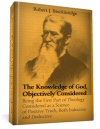
Robert J. Breckinridge's first volume of systematic theology, The Knowledge of God, Objectively Considered, is divided into five parts:
- Book One: Man
- Book Two: The Mediator
- Book Three: God
- Book Four: Sources of Knowledge
- Book Five: Sum and Result
Breckinridge has presented the ancient truths of salvation with a freshness, an unction, and a power which vindicate to them the real character of a Gospel.
—James Henry Thornwell
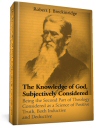
Robert J. Breckinridge's second volume of systematic theology, The Knowledge of God, Subjectively Considered, is divided into five parts:
- The Covenant of Grace
- Union and Communion with the Son of God
- The Offices of Christianity
- Communion of Saints
- Gifts of God to His Church
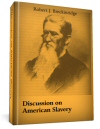
Discussion on American Slavery
- Author: Robert J. Breckinridge
- Publisher: Isaac Knapp
- Publication Date: 1836
- Pages: 102
Robert J. Breckinridge, a staunch anti-slavery Presbyterian preacher faced-off in a heated debate with George Thompson, a high profile British abolitionist that accused all American ministers of promoting slavery. The debate was held over five nights at a neutral chapel in Glasgow, Scotland. The conditions set for the debate were as follows:
- That the discussion should commence on a Monday, and continue until the matter was resolved to each party's satisfaction
- Each speaker received a half-hour to speak, alternately, though the debate was not to exceed three hours each night
- That admission was by ticket only, with a maximum capacity of 1,200
- That neither speaker should be interrupted in their speeches
- There were to be no questions or polls from the audience
This debate, which lasted five nights and sold out to capacity each time, offers a unique window into history and the abolitionist movements on both sides of the Atlantic.
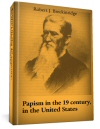
This volume contains thirty-three essays and addresses by Breckinridge discussing the similarities and differences between the Roman Catholic Church and early nineteenth-century Protestantism. This volume reveals a tenuous relationship between Protestants and Catholics in Breckinridge’s era, yet testifies to his unswerving belief and thorough command of doctrine.
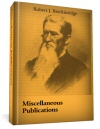
Miscellaneous Publications
- Author: Robert J. Breckinridge
- Publisher: Sands and Neilson
- Publication Date: 1834
- Pages: 481
Miscellaneous Publications contains the following ten works by Robert J. Breckinridge:
- Immorality of the Traffic, Manufacture, and Use of Ardent Spirits as a Drink
- Calling on the Church of Christ and the Rule of Her Faith: Two Discourses
- Second Defense
- The Civil War: Its Nature and End
- The Third Defense
- The Christian Pastor
- Denominational Education
- Fidelity in Our Lot
- Our Country
- The Great Deliverance and the New Career
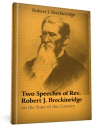
Two Speeches of Rev. Robert J. Breckinridge on the State of the Country
- Author: Robert J. Breckinridge
- Publisher: E. Morgan and Co.
- Publication Date: 1862
- Pages: 44
This short volume contains two eloquent speeches by Robert J. Breckinridge, both from 1862, during the second year of the American Civil War. Being from Kentucky, a state that permitted slavery, Breckinridge risked his life on several occasions to preach his abolitionist views and voice his support for the Union and President Lincoln.
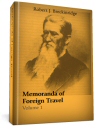
Robert J. Breckinridge's two-volume travel memoir Memoranda of Foreign Travel documents his pilgrimage through Western Europe during the years 1836–1837.
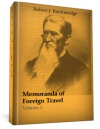
The second volume of Robert J. Breckinridge's two-volume travel memoir Memoranda of Foreign Travel that documents his pilgrimage through Western Europe during the years 1836–1837.
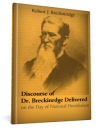
Discourse of Dr. Breckinridge Delivered on the Day of National Humiliation
- Author: Robert J. Breckinridge
- Publisher: John W. Woods
- Publication Date: 1861
- Pages: 16
This passionate speech was given in Lexington, Kentucky at the very beginning of the American Civil War in April of 1861. Kentucky adopted an official policy of neutrality, but Breckinridge foresaw the moral and practical problems that decision created.
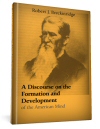
In this patriotic discourse, given before the Literary Societies of Lafayette College in 1837, Robert J. Breckinridge championed the virtues and morals that America was founded on and argued that providing an education for every child would make America a shining example for the rest of the world.
About Robert J. Breckinridge
Robert J. Breckinridge, (1800–1871) grandfather of Benjamin Breckinridge Warfield, was a politician, Presbyterian minister, author, abolitionist, and champion of education. Ordained in 1832, Breckinridge pastored the Second Presbyterian Church of Baltimore, Maryland before accepting the position of President of Jefferson College in 1845. Soon after, Breckinridge would return to his native Kentucky as a pastor of the First Presbyterian Church of Lexington and as Superintendent of Public Education. Under his guidance, attendance increased ten-fold. As the civil war unfolded, Breckinridge was an outspoken abolitionist and supporter of the Union, a position not popular in his home state of Kentucky.
Reviews
4 ratings

Allan Story
5/5/2017

Larry Proffitt (I
11/19/2013

Bill Shewmaker
10/8/2013
Phil Niebergall
7/30/2013